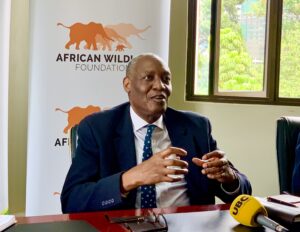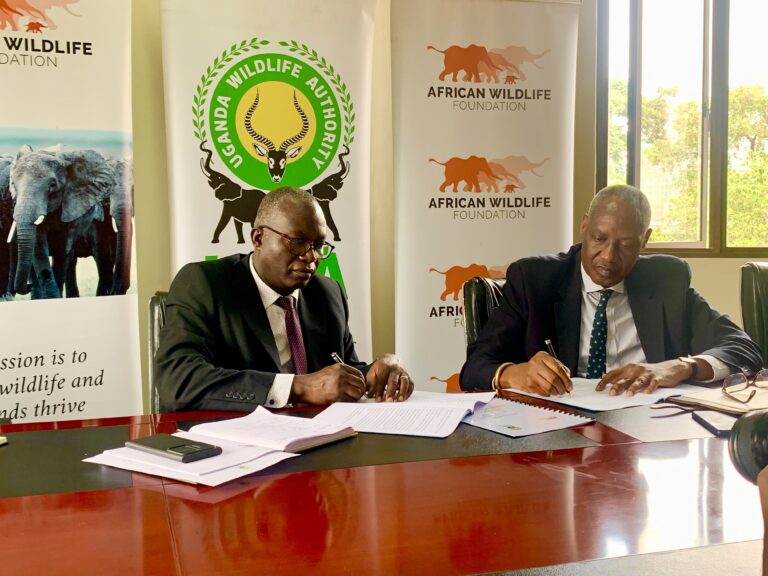The renewal of the partnership between the African Wildlife Foundation (AWF) and Uganda Wildlife Authority (UWA) for an additional 5 years will reinforce conservation efforts in Uganda, Kaddu Ssebunya, AWF CEO has said.
The two entities signed a Memorandum of Understanding (MoU) on Thursday June 22 at the UWA offices in Kampala, furthering AWF’s operations in Uganda and its partnership with UWA towards protection of endangered and common species especially the great apes within Uganda and its transboundary landscapes among other objectives.
“The decade-long partnership between AWF and UWA is evidence of the benefits of collaboration in conservation. Uganda has made significant strides in conservation including curtailment of the illegal wildlife trade to a minimum and the partnership we are renewing today has been a key enabling factor in this. Going forward, we are excited about the potential opportunities that lie ahead and the monumental strides we shall achieve,” Kaddu said.
Kaddu emphasized the need to establish conservation enterprises that enhance local community benefits and nature conservation within the major national parks in Uganda including Kidepo National Park, Murchison Falls National Park, Queen Elizabeth National Park and their respective peripherals.
“Covid-19 showed us that tourism is not enough to sustain conservation. Conservation has to be a business. It is now a socio-economic and political issue. Diversifying the conservation business into other areas like governance and political systems, agriculture, energy is critical and that’s where AWF’s conservation capital comes in. We need to build business pipelines from a conservation space to attract private sector involvement. Conservation cannot continue to be a charitable business and depending on aid because that’s not sustainable,” he added.

This comes at a time when the Uganda Wildlife Authority is enhancing measures against the human-wildlife conflicts, empowering communities around the national parks and diversifying conservation strategies.
Speaking at the MoU signing, UWA Executive Director Sam Mwandha commended AWF’s endeavors in the promotion of biodiversity preservation in the country and pledged to offer any assistance required to enable the organization accomplish its strategic vision and conservation objectives in Uganda.
“Over the years, AWF has helped us in our conservation efforts and prioritized the livelihoods of the local community. All these actions continue to primarily benefit the communities so these engagements are ideal at the moment,” Mwandha said.

Legal and Illegal Wildlife trade in Uganda
Wildlife trade is any sale or exchange of wild animal and plant resources by people. It involves thousands of different fauna and flora species, provides a source of income for producers, raw materials for businesses and local collectors.
Kaddu noted that though Uganda has managed to reduce illegal wildlife trade, the vice cannot be completely eliminated if the demand for products like bush meat, ivory among others is not stopped in major destination markets like China and other countries in North America and Europe.
According to the Wildlife Conservation Society, Uganda has registered an upsurge in wildlife product trafficking since 2010 and over the last five (5) years, approximately 9961.45kg of ivory, 17.75kg of rhino horn and 1,374.7kg of pangolin scales have been confiscated in the country.
The report also indicates that 80% of ivory seizures across Africa occur in Tanzania, Uganda and Kenya.
Kaddu further stated that even the existing legal wildlife trade does not benefit Africans and should be highly discouraged.
“We need to address, as Africans, the idea that someone is coming to this continent to take away wildlife like they did with slaves and sell it outside with no profit left for any African government. This is a trillion -dollar business which doesn’t benefit any treasury in Africa. We need to step up and stop the idea of legal wildlife trade,” said Kaddu.
AWF is using the behaviour change approach to engage the Chinese government and enterprises and interest them to adopt anti-trade and anti-trafficking policies to reduce the demand for wildlife products and the involvement of Chinese nationals in illegal wildlife trade.
“We are part of the group that engaged China, about four years ago, to ban internal ivory trade and that reduced demand for ivory by 70%. It cut the ivory price by 80%. That’s what we are doing and we believe that until the demand stops, the killing will not stop. So, our efforts are along that line as regards wildlife trafficking,” Kaddu explained.

